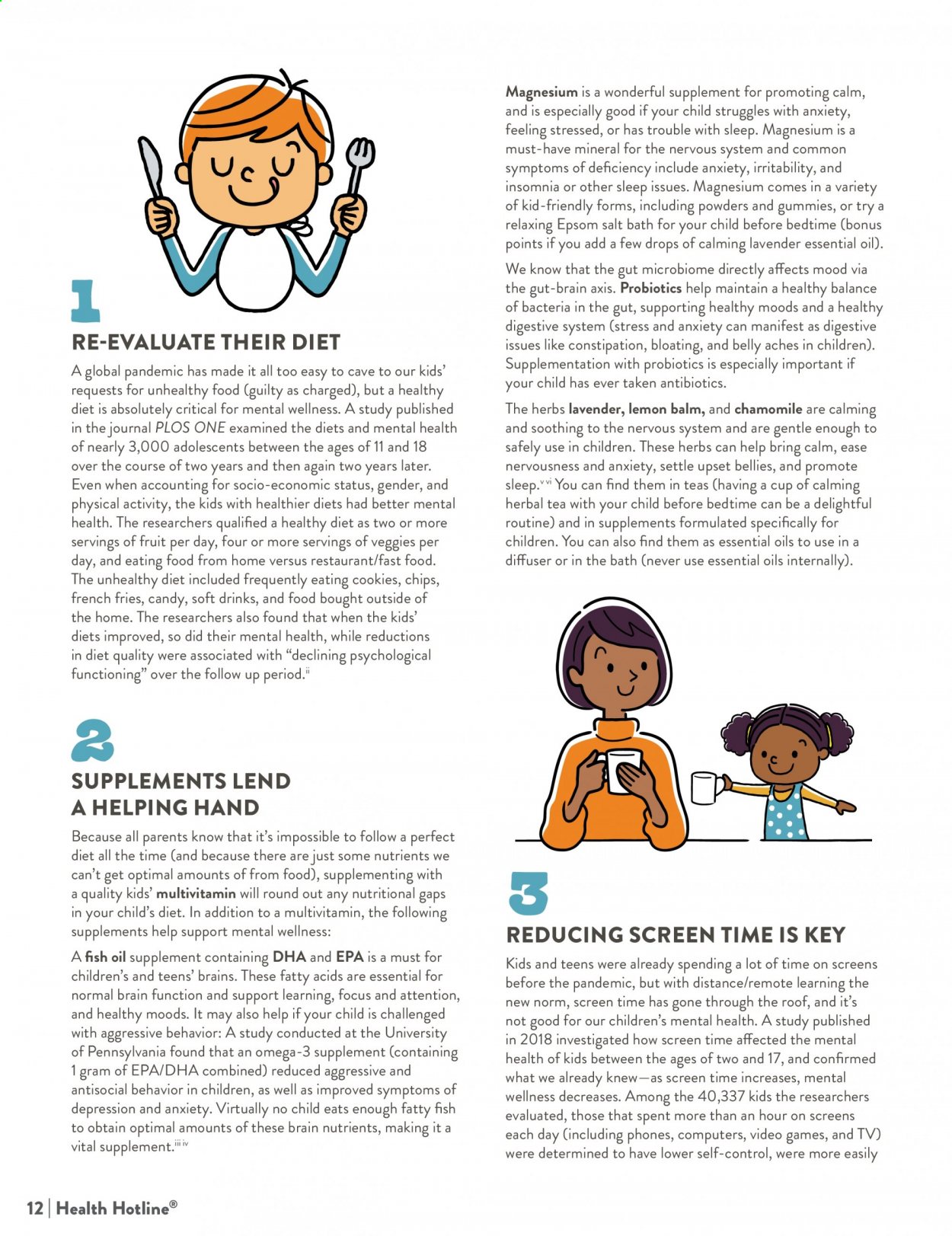Magnesium is a wonderful supplement for promoting calm,
and is especially good if your child struggles with anxiety,
feeling stressed, or has trouble with sleep. Magnesium is a
must-have mineral for the nervous system and common
symptoms of deficiency include anxiety, irritability, and
insomnia or other sleep issues. Magnesium comes in a variety
of kid-friendly forms, including powders and gummies, or try a
relaxing Epsom salt bath for your child before bedtime (bonus
points if you add a few drops of calming lavender essential oil).
1
RE-EVALUATE THEIR DIET
A global pandemic has made it all too easy to cave to our kids’
requests for unhealthy food (guilty as charged), but a healthy
diet is absolutely critical for mental wellness. A study published
in the journal PLOS ONE examined the diets and mental health
of nearly 3,000 adolescents between the ages of 11 and 18
over the course of two years and then again two years later.
Even when accounting for socio-economic status, gender, and
physical activity, the kids with healthier diets had better mental
health. The researchers qualified a healthy diet as two or more
servings of fruit per day, four or more servings of veggies per
day, and eating food from home versus restaurant/fast food.
The unhealthy diet included frequently eating cookies, chips,
french fries, candy, soft drinks, and food bought outside of
the home. The researchers also found that when the kids’
diets improved, so did their mental health, while reductions
in diet quality were associated with “declining psychological
functioning” over the follow up period.ii
We know that the gut microbiome directly affects mood via
the gut-brain axis. Probiotics help maintain a healthy balance
of bacteria in the gut, supporting healthy moods and a healthy
digestive system (stress and anxiety can manifest as digestive
issues like constipation, bloating, and belly aches in children).
Supplementation with probiotics is especially important if
your child has ever taken antibiotics.
The herbs lavender, lemon balm, and chamomile are calming
and soothing to the nervous system and are gentle enough to
safely use in children. These herbs can help bring calm, ease
nervousness and anxiety, settle upset bellies, and promote
sleep.v vi You can find them in teas (having a cup of calming
herbal tea with your child before bedtime can be a delightful
routine) and in supplements formulated specifically for
children. You can also find them as essential oils to use in a
diffuser or in the bath (never use essential oils internally).
2
SUPPLEMENTS LEND
A HELPING HAND
Because all parents know that it’s impossible to follow a perfect
diet all the time (and because there are just some nutrients we
can’t get optimal amounts of from food), supplementing with
a quality kids’ multivitamin will round out any nutritional gaps
in your child’s diet. In addition to a multivitamin, the following
supplements help support mental wellness:
A fish oil supplement containing DHA and EPA is a must for
children’s and teens’ brains. These fatty acids are essential for
normal brain function and support learning, focus and attention,
and healthy moods. It may also help if your child is challenged
with aggressive behavior: A study conducted at the University
of Pennsylvania found that an omega-3 supplement (containing
1 gram of EPA/DHA combined) reduced aggressive and
antisocial behavior in children, as well as improved symptoms of
depression and anxiety. Virtually no child eats enough fatty fish
to obtain optimal amounts of these brain nutrients, making it a
vital supplement.iii iv
12 | Health Hotline®
3
REDUCING SCREEN TIME IS KEY
Kids and teens were already spending a lot of time on screens
before the pandemic, but with distance/remote learning the
new norm, screen time has gone through the roof, and it’s
not good for our children’s mental health. A study published
in 2018 investigated how screen time affected the mental
health of kids between the ages of two and 17, and confirmed
what we already knew—as screen time increases, mental
wellness decreases. Among the 40,337 kids the researchers
evaluated, those that spent more than an hour on screens
each day (including phones, computers, video games, and TV)
were determined to have lower self-control, were more easily




